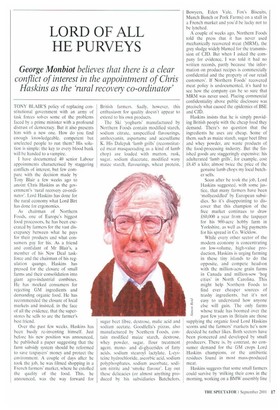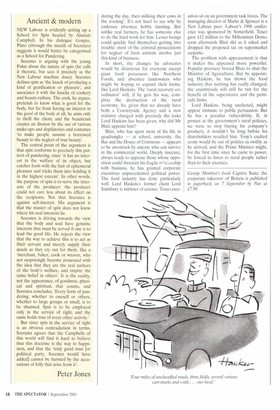LORD OF ALL HE PURVEYS
George Monbiot believes that there is a clear
conflict of interest in the appointment of Chris Haskins as the 'rural recovety co-ordinator'
TONY BLAIR'S policy of replacing constitutional government with an army of task forces solves some of the problems faced by a prime minister with a profound distrust of democracy. But it also presents him with a new one. How do you find enough knowledgeable, competent but unelected people to run them? His solution is simple: the key to every blood bank will be handed to a vampire.
I have documented 40 senior Labour appointments characterised by staggering conflicts of interest, but few compare with the decision made by Tony Blair a few weeks ago to anoint Chris Haskins as the government's 'rural recovery co-ordinator'. Lord Haskins has done for the rural economy what Lord Birt has done for ergonomics.
As chairman of Northern Foods, one of Europe's biggest food processors, he has been execrated by farmers for the vast discrepancy between what he pays for their products and what consumers pay for his. As a friend and confidant of Mr Blair's, a member of his New Deal taskforce and the chairman of his regulation quango, Haskins has pressed for the closure of small farms and their consolidation into giant agro-industrial combines. He has mocked consumers for rejecting GM ingredients and demanding organic food. He has recommended the closure of local markets and insisted, in the face of all the evidence, that the superstores he sells to are the farmer's best friend.
Over the past few weeks, Haskins has been busily re-inventing himself. Just before his new position was announced, he published a paper suggesting that the farm subsidy system should be reformed to save taxpayers' money and protect the environment. A couple of days after he took the job, he was filmed shopping in a French farmers' market, where he extolled the quality of the food. This, he announced, was the way forward for British farmers. Sadly, however, this enthusiasm for quality doesn't appear to extend to his own products.
The Ski 'yoghurts' manufactured by Northern Foods contain modified starch, sodium citrate, unspecified flavourings, anthocyanin, aspartame and acesulfame K. His Dalepak 'lamb grills' (reconstituted meat masquerading as a kind of lamb chop) are loaded with mutton, rusk, sugar. sodium diacetate. modified waxy maize starch, flavourings, wheat protein, sugar beet fibre, dextrose, malic acid and sodium acetate. Goodfella's pizzas, also manufactured by Northern Foods, contain modified maize starch, dextrose, whey powder, sugar, flour treatment agent, monoand di-glycerides of fatty acids, sodium stearoyl lactylate, L-cysteine hydrochloride, ascorbic acid, sodium polyphosphates, sodium ascorbate, sodium nitrite and 'smoke flavour'. Lay out these delicacies (or almost anything produced by his subsidiaries Batchelors, Bowyers, Eden Vale, Fox's Biscuits, Munch Bunch or Pork Farms) on a stall in a French market and you'd be lucky not to be lynched.
A couple of weeks ago, Northern Foods told the press that it has never used mechanically recovered meat (MRM), the grey sludge widely blamed for the transmission of CJD. But when I asked the company for evidence, I was told it had no written records, partly because 'the information on product recipes is commercially confidential and the property of our retail customers'. If Northern Foods' recovered meat policy is undocumented, it's hard to see how the company can be so sure that MRM was never used. Placing commercial confidentiality above public disclosure was precisely what caused the epidemics of BSE and CJD.
Haskins insists that he is simply providing British people with the cheap food they demand. There's no question that the ingredients he uses are cheap. Some of them, such as maize starch, sugar beet fibre and whey powder, are waste products of the food-processing industry. But the finished goods are staggeringly expensive: his adulterated 'lamb grills', for example, cost £8.45 a kilo; almost twice the price of the genuine lamb chops my local butch er sells.
Soon after he took the job, Lord Haskins suggested, with some justice, that many farmers have been 'mollycoddled' by European subsidies. So it's disappointing to discover that this champion of the free market continues to draw £60,000 a year from the taxpayer for his 900-acre hobby farm in Yorkshire, as well as big payments for his spread in Co. Wicklow.
While every other sector of the modern economy is concentrating on low-volume, high-value production, Haskins is urging farming in these tiny islands to do the opposite, and compete head-on with the million-acre grain farms in Canada and million-sow 'hog cities' in North Carolina. This might help Northern Foods to find ever cheaper sources of trashy ingredients, but it's not easy to understand how anyone else will gain. The only farms whose trade has boomed over the past few years in Britain are those supplying the organic food Lord Haskins scorns and the farmers' markets he's now decided he rather likes. Both sectors have been pioneered and developed by small producers. There is, by contrast, no consumer demand for the GM crops Lord Haskins champions, or the antibiotic residues found in most mass-produced meat.
Haskins suggests that some small farmers could survive by 'milking their cows in the morning, working on a BMW assembly line during the day, then milking their cows in the evening'. It's not hard to see why he endorses absentee hobby farming. But unlike real farmers, he has someone else to do the hard work for him. Lesser beings could quickly find themselves getting into trouble: most of the criminal prosecutions for neglect of farm animals involve just this kind of business.
In short, the changes he advocates would be disastrous for everyone except giant food processors like Northern Foods, and absentee landowners who might be hoping to expand their farms, like Lord Haskins. The 'rural recovery coordinator' will, if he gets his way, complete the destruction of the rural economy. So, given that we already have both a Countryside Agency and a new ministry charged with precisely the tasks Lord Haskins has been given, why did Mr Blair appoint him?
Blair, who has spent most of his life in quadrangles — at school, university, the Bar and the House of Commons appears to be awestruck by anyone who can survive in the commercial world. Deeply insecure, always ready to appease those whose opposition could threaten his fragile rela:oriship with business, he has granted corporate executives unprecedented political power. The food industry has done particularly well. Lord Haskins's former client Lord Sainsbury is minister of science. Tesco exec utives sit on six government task forces. The managing director of Marks & Spencer is a New Labour peer. Labour's 1998 conference was sponsored by Sornerfield. Tesco gave £12 million to the Millennium Dome; soon afterwards Blair did as it asked and dropped the proposed tax on supermarket carparks.
The problem with appeasement is that it makes the appeased more powerful. Popular pressure forced Blair to shut the Ministry of Agriculture. But by appointing Haskins, he has shown the food industry that nothing has really changed; the countryside will still be run for the benefit of the superstores and the pesticide firms.
Lord Haskins, being unelected, might appear immune to public persuasion. But he has a peculiar vulnerability. If, in protest at the government's rural policies, we were to stop buying his company's products, it wouldn't be long before his shareholders recalled him. Tony's exalted crony would be out of politics as swiftly as he arrived, and the Prime Minister might, for the first time since he came to power, be forced to listen to rural people rather than to their enemies.
George Monbiot's book Captive State: the corporate takeover of Britain is published in paperback on 7 September by Pan at 17.99.



























































 Previous page
Previous page